 |
 |
 |
 |
 |
 |
 |
 |
 |
First Division - Stamford Bridge - 57,221
Scorers: Clarke, Cooper, Giles pen, Lorimer, Jones
Chelsea: Hughes, Webb, McCreadie, Hollins, Dempsey, Harris, Cooke Hudson, Osgood, Hutchinson, Houseman
Leeds United: Sprake, Reaney, Cooper, Bremner, Charlton, Hunter, Lorimer, Clarke (Bates), Jones, Giles, Madeley
Leeds played out a number of spiteful clashes with Arsenal, but matches
against Chelsea were something else, generally guaranteed to be among
the most fiercely contested in the English game. There was a terrible
enmity between the two sides but that was as nothing next to the ill-feeling
between followers of the two clubs. Chelsea supporters harboured a pathological hatred of United, despising
them for the win at all costs attitude that had become their trademark.
Don Revie had espoused a new attacking
philosophy during the autumn of 1969, but it would take far more than
that for Southern crowds to allow bygones to be bygones. Rick Glanvill in Chelsea FC - The Official Biography: 'It always
rears its ugly head, even when we're nowhere near them. As predictably
as the late plod of Corporal Jones' foot, when Leeds fans gather in any
stand, they will sing their song about their Cockney rivals. "Fetch
your father's gun and shoot the Chelsea scum." Chelsea fans still
sometimes reciprocate with an elegy to the hatred of Leeds over the tune
of "The Dambusters March". We know that the 1970 FA Cup final
was dirtier than Paris Hilton's home video collection, but the unmitigated
mutual hatred between Leeds and Chelsea started before that. 'Perhaps we should blame the M1. The extension from Aston to Leeds was
completed in July 1967 and it was almost as if the new infrastructure
made loathing, as well as other goods, easier to transport. Three months
before that was the match that may have ignited the whole thing. But by
then there had already been several bouts in the classic Yorkshire grit
versus flash Cockney encounter. 'There was a fifth round Cup epic in 1952, settled at Villa Park with
a Monday afternoon kick off at 2.30 pm. Boisterous youth product Bobby
Smith was "a lively spearhead" and gave celebrated Welsh centre-half
John Charles a nightmare game.
Charles twice slipped up for Smith, wearing borrowed boots, to capitalise.
It ended 5-1 but the ferocious tackling of the first replay at Stamford
Bridge had forced Chelsea into seven changes for the subsequent league
game. Nearly 150,000 fans watched the three games - and winced. 'Early in World Cup year, 1966, the fourth round draw brought the two
foes together again. The Times enthused, "Chelsea and Leeds
are two of the most fancied teams for Wembley. Heaven help those who live
in the Fulham area who own a motorcar; heaven help those who wish for
a ticket on 12 February. It should be a taut match. The winner should
reach Wembley, and the winner may well be Chelsea." 'The winner definitely wasn't going to be football. 'There were chaotic scenes outside Stamford Bridge before the game with
a 57,000 crowd there to see the previous year's beaten finalists lose
1 -0 to a Tambling strike. The police dealt with it harshly. "One
will hope," said The Times, "that the expression cross
swords will prove groundless in the sense of bared sheaths". 'At times Chelsea were left 'spinning like a top' by Leeds' fluid formation,
Madeley acting as a deep-lying centre-forward to cover Osgood - who "drifts
about as silently and elusively as a smoke ring". Boyle and Bremner
'The following year, the humour of the FA Cup draw became vindictive.
Leeds and Chelsea met in the 1967 semi-final at
Villa Park with 62,378 in attendance. With major semi-final wins proving
elusive, the game was billed as manager Docherty's "triumph of mind
over matter, of willpower over the perpetual inertia that once reigned
at Stamford Bridge". On the day he sacrificed brilliance for a backbone
and changed the forward line, exploiting the absence of broken toe victim
Jackie Charlton. Now came the compellingly
disappointing Hateley's greatest triumph: his headed winner from Cooke's
run and cross. 'There were other little skirmishes. McCreadie snapped at Giles' heels.
"The tackling throughout was frighteningly ruthless," thought
one reporter, "and too often retaliation was penalised while provocation
escaped unseen. Shirts, elbows and studs were used and abused; to be caught
in possession was like standing in the path of a stampede." 'Then came a controversy … As Chelsea tired, Leeds laid siege to Bonetti's
goal and twice put the ball over the line in melees. The first was undoubtedly
offside, but it came as a great relief to Chelsea when the second, a thunderbolt
from the hammer boot of Lorimer, did not stand. The referee ordered a
retake, because he had been directing Chelsea's wall back the full ten
yards when it was taken, to the fury of Leeds' players. The Blues then
held out and, at the end, Docherty danced a provocative jig of joy.' The ill-feeling was stoked up again during United's 2-0 win in the league
at Elland Road in September 1969, as reported by Phil Brown for the Yorkshire
Evening Post: 'I do not want to see another game like Saturday's.
These are two good sides at their best ... but the calibre of such teams
is largely wasted when they set their teeth and play as venomously as
that. Late and early tackles, too vehement charging, abounded. I could
admire the physical effort and stamina of both, and the pluck, and I will
defend a heavy fair charge to the death. It is as much part of football
as anything else, like Charlton standing on opponents' goal lines. But
United and Chelsea both overshot in zeal, and the football of which both
are capable came only briefly into sight.' Charlton and Clarke for Leeds, and Webb, Harris, Houseman and Birchenall
of Chelsea all sustained injuries in the game and were out for several
games. While Chelsea generally had the Indian sign over United in the Cups (Leeds
have never beaten the Stamford Bridge side in a knock out competition),
it was the Whites who had dominated recent league encounters, winning
five and drawing three of the previous eight. That run included a 7-0
slaughter at Elland Road in October 1967. The First Division clash at Stamford Bridge in January 1970 took place
with Leeds second and Chelsea third in the table, both chasing pace setters
Everton. United went into the game in fine form. They had lost only once since
their League Cup exit against Chelsea in October, and had won seven of
their previous eight games; their starting eleven was unchanged for the
fifth successive fixture. The Whites' defence had lost the impregnability
of their championship season, but they had nevertheless conceded just
26 goals in 36 games since the start of the campaign. Chelsea were also in a good spell, scoring 14 goals in winning the previous
four matches and home advantage was fancied to give them the upper hand.
Their only real concern was the absence of goalkeeper Peter Bonetti with
a sore throat - Bonetti had given a series of match winning displays against
Leeds over recent seasons and would be a hard act to follow for Scotland
Under-23 keeper Tommy Hughes. There had been speculation that Chelsea
would have to call up the teenager Davey, but in the end Hughes was adjudged
fit enough to start; he must have regretted that decision. The Blues were also able to field two exciting young forwards: Ian Hutchinson
and Alan Hudson. 21-year-old Hutchinson was a physical centre-forward who had been signed
from Cambridge United in July 1968 for £5,000. He had earned a brief 'Though he was never fêted as an outright star in the manner of fellow
Blues Peter Osgood, Charlie Cooke and Alan Hudson, Hutchinson was hailed
as a talisman by those illustrious comrades. Such was his willingness
to scrap for every ball, he offered the ultimate get out for team mates
under pressure. Hudson, for example, described Hutchinson as a midfielder's
dream, a selfless performer who could turn bad passes into good ones,
though arguably it was Osgood who benefited most from his close friend's
abrasive style. Hutchinson was the first of Osgood's co-strikers to take
on the role of target man, thus creating space and time for his infinitely
more artistic partner to prosper. 'Yet for all his oxlike strength and his evident relish in crashing through
tackles which would floor most men, it would be unjust to dismiss Hutchinson
as a mere clodhopper. Though he could look ungainly, even clumsy, there
were moments when he would reveal a delightfully delicate touch on the
ball. In addition he offered formidable pace, he was majestic in the air
- like all outstanding headers, such was the precision of his timing that
he created the optical illusion of seeming to hang in space while waiting
for a pass to arrive - and he packed a savage shot in either foot. Then
there was the Hutchinson speciality, a prodigiously long throw, which
was once measured at some 112 feet and which, due to its power and remarkable
variety of trajectory, was as valuable an attacking weapon as any corner
kick.' Even more well regarded was an 18-year-old midfield playmaker. CFC.net:
'Alan Hudson is a true football icon. Revered by old school Blues supporters
and the schoolboy generation to which I belonged at the time he graced
the hallowed Stamford Bridge turf, the very mention of his name conjures
up memories of the kings of the Kings Road era Chelsea side that brought
panache, verve and flair to the English game during the glamorous years
that followed the national side's World Cup triumph of 1966.' The January 1970 clash at Stamford Bridge saw United facing the usual
hostile environment. Terry Brindle wrote in the Yorkshire Post
of the day's passionate atmosphere, ;Leeds United, who still smart under
a lingering reputation which denies their skill and emphasises their toughness
south of the Wash, were as keen to win friends as they were to influence
their championship claims at Chelsea. ... Chelsea's supporters ... booed
when Leeds went into the field, jeered when Clarke and Jones went down
injured, hissed Hunter and Charlton long and loud when inflammatory fouls
had ceased to have any bearing on the match. Leeds were as tough and uncompromising
as only they can be, but dirty? Not by any yardstick acceptable in the
North. Chelsea were no saints. Clarke hobbled off with a gashed shin ...
and is out of the reckoning for England's match on Wednesday. Giles had
a bruised calf, treatment of which could, like Clarke's injury, be 'a
long job' according to the Leeds trainer, Mr Les Cocker.' Rain fell incessantly in the hours leading up to kick off, leaving the
playing surface heavy with rain. It had stopped about half an hour before
the start, but there were standing pools of water in parts of the pitch
and the conditions meant that mistakes were inevitable, making for some
exhilarating football. Billy Bremner won the toss and his team were immediately onto the offensive.
Chelsea fought back, however, and went close. A long throw in from Ian
Hutchinson offered a chance and Gary Sprake was forced into a save. Another
Hutchinson throw brought Peter Houseman the opportunity to shoot through
a ruck of defenders, but it was United who took a 15th-minute lead. Bremner played a smart through ball for Mick Jones to chase. The burly
centre-forward got to it and put in a shot which was blocked by Hughes,
flying out wide of the right hand post. It was only a temporary reprieve
- the master goal poacher, Allan Clarke, was lurking on the right spot
to hook the loose ball home with an assured finish. Shortly afterwards Hughes snatched a Lorimer centre off Clarke's head
and set the Blues away. Chelsea could have equalised when Reaney miscued
a clearance across his own area, but David Webb drove the opportunity
well wide with a real defender's effort. The opening goal had raised the temperature and there was an unpleasant
clash between Hutchinson and Norman Hunter with the Leeds man receiving
a stern lecture from referee Bill Gow. Again the home men fluffed an opening when Charlie Cooke fired wide from
a lay back by Peter Osgood, but it was United who almost snatched the
second goal around the 35 minute mark. Clarke hammered home a shot from
the penalty spot, but the referee had already stopped the game for a foul
by Jones on Hughes. Leeds paid a high price for, as he was in the act
of shooting, Clarke fell victim to a desperate late tackle and had to
limp off. Before Mick Bates could come off the subs' bench to replace Clarke, the
sides were on level terms. John Hollins burst from midfield and stormed
through the heart of the United defence with the ball; from 15 yards,
he fired in off the crossbar, raising a tumultuous cheer all round Stamford
Bridge. Four minutes before the interval Chelsea took the lead. Hutchinson had
the opportunity for another of his whirlwind long throws and it allowed
Osgood to swivel into an unstoppable volley from an acute angle. It was a real shock to the United system and for a while they were in
some disarray. Hunter received another reprimand as the game threatened
to boil over. If not for 'the fine positioning of Sprake and the snaking
legs of Charlton' (Brindle) the visitors might have been even further
behind when Don Revie gave his half-time team talk. The The move reaped an almost immediate harvest, but not before Sprake had
to make a point blank stop from Hutchinson to turn the ball round the
post. That was merely the prelude to a United revival and seconds later,
Bremner set them away, feeding Cooper on the edge of the area. The left-back
volleyed home a fine equaliser, though Hughes should have done better
with his attempted save. The tide had turned in stunning fashion, and United soon restored their
lead. After 57 minutes, with Leeds exerting heavy pressure, Blues centre-back
John Dempsey was panicked into handling the ball in his area and referee
Gow awarded Leeds a penalty. Johnny Giles gave Hughes no chance with a
cool spot kick. There was no holding the Yorkshiremen now and within a couple of minutes
the advantage was 4-2. Lorimer thundered into a low shot which beat the
dive of Hughes. It entered the net with the onrushing Bremner not even
needing to apply the finishing touch. Three more minutes and United had a fifth, with Jones scoring from close
range after a Bremner header. Hughes again looked at fault, standing aghast
afterwards as Jones gleefully recovered the ball from the back of the
net. The Londoners' cause was not helped by defender Webb's insistence on
making his way ambitiously into the Leeds half at every opportunity. His
absence gave the razor sharp United forwards acres of space and they ruthlessly
exploited every opportunity that came their way. Leeds' storming start to the second half left the home men shell shocked.
Chelsea had no answer for the urgent thrusts of the visitors. It was the
perfect example of what Don Revie had aspired to when he promised to let
his men off the leash at the start of the season. The performance had the football writers drooling with admiration. The
BBC's cameras were on hand to catch the game for Saturday night's Match
of the Day audience and recorded Leeds United at their clinical best.
In one spell of 17 minutes, the Whites earned more plaudits from the neutrals
than they had done in the preceding five years. They were unstoppable,
effortlessly dissecting Chelsea. Goalkeeper Hughes was roundly panned
for a series of errors, but he was given scant protection and it would
have mattered little who was in the Chelsea goal that day - few would
have been able to deny United their day of glory. The former Clydebank keeper only made 11 league appearances in his six
years at Stamford Bridge and the disaster against United effectively ended
his Chelsea career - he signed for Aston Villa in May 1971, later spending
time at Brighton and Hereford. United had enjoyed higher scores earlier in the season, 10-0
and 6-0 against Lyn Oslo in the European Cup, 6-1 against Nottingham
Forest, but those victories were achieved against weak opponents - the
win at Stamford Bridge was something else, achieved against championship
rivals who boasted some of the finest players in the country, a team that
had been outplaying United. Yet in the final Brindle: 'The crest of noise on which Chelsea had ridden died away as
suddenly as the team's challenge. Leeds went about their plunder of two
points in an atmosphere reminiscent of soccer's version of rififi - each
man uncannily aware of his own role and the role of his colleagues. Giles
guided passes through the flimsy Chelsea defence from 30, 40, 50 yards
- you could almost hear his brain tacking out new ploys to frustrate the
opposition - Bremner became almost arrogant in his ability to create space
up front. That pair did as much with the side of their feet and a flick
of the hips as many of Chelsea's players did with much hustle and bustle
all afternoon.' Geoffrey Green in The Times: 'lf anyone was inclined to question
that Leeds United are the most efficient and consistent side in the League,
their doubts must have been dispelled and their eyes opened at Stamford
Bridge on Saturday. Chelsea, unbeaten at home all season and challenging
for the title, were given a sharp rap over the knuckles and a lecture
into the bargain. Leeds as a side are as hard as teak, and tongued and
grooved through and through. It is difficult to drive a nail into them. 'Completely professional in all they do, they now revealed what they
have picked up in hard European competition over recent seasons - the
ability to play possession football when necessary, or to use the full
length and breadth of the pitch, and especially a heavy, muddy one as
was Stamford Bridge on this occasion. In addition, they continue to have
the gift of snatching goals out of thin air almost from nothing, like
a conjurer, and the knack of punishing the tiniest mistake to the full. 'In 17 remarkable minutes after the restart they turned the game upside
down and tore the Chelsea defence to shreds ... Leeds rubbed it in ruthlessly
and shut Cooke and Osgood out of the game while those two mighty atoms,
Giles and Bremner pulled all the strings for a brilliant victory.' Andrew Mourant: 'On 10 January a television audience of millions saw
one of the most prodigious performances that Leeds United had ever given.
The opponents were Chelsea and Leeds' show was played out before a largely
hostile audience of 57,221, at Stamford Bridge. The Londoners were a good
side, in form and in third place; and sufficiently inspired by the occasion
to take a 2-1 lead by half-time. No-one could have envisaged what was
in store for them in the 45 minutes that followed. Leeds marshalled their
forces and dictated the game in a manner that had many, including television
commentators, groping for words, as they played with a power, assurance
and authority that the English game had rarely seen. The 2-1 deficit had
turned into a 5-2 victory by full-time. Chelsea had not disintegrated;
they had simply run into a force which, that afternoon, neither they nor
probably any other team could have survived.' 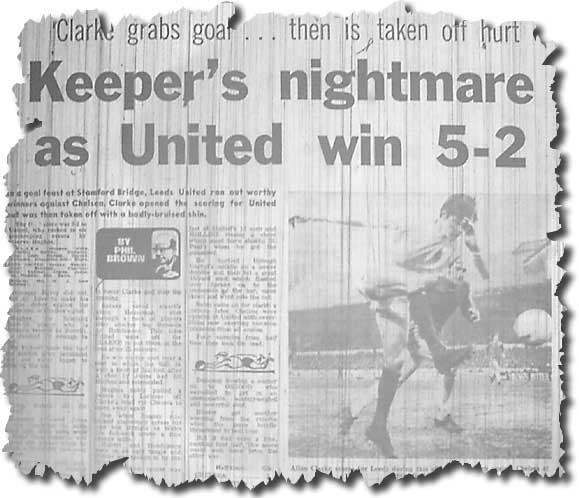 During
the late Sixties, Leeds United developed bitter rivalries with a number
of the major clubs of the day: Liverpool, Everton and Manchester United
were involved in some hard fought battles, but it was the confrontations
with the so-called Southern softies that really brought out the worst
in the Yorkshiremen.
During
the late Sixties, Leeds United developed bitter rivalries with a number
of the major clubs of the day: Liverpool, Everton and Manchester United
were involved in some hard fought battles, but it was the confrontations
with the so-called Southern softies that really brought out the worst
in the Yorkshiremen.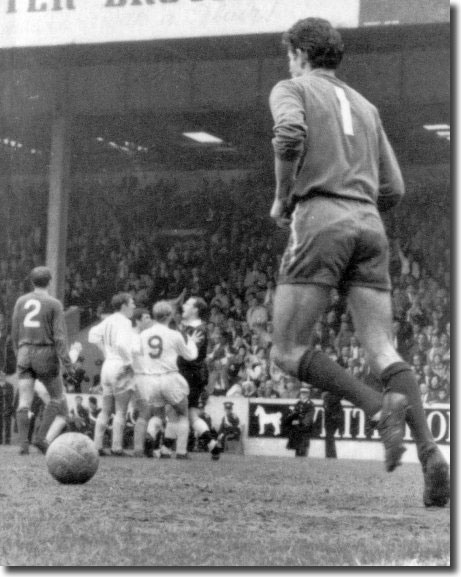 were
booked. Bonetti made three or four world class saves. The template was
established.
were
booked. Bonetti made three or four world class saves. The template was
established.
run in the side in 1968/69 and in the current season was on his way to
22 goals from 35 starts. He was to die an untimely death aged just 54
in 2002, when The Independent paid him this tribute: 'Brave almost
beyond belief and ferociously aggressive, he paid a daunting penalty for
his courage, being invalided out of the game following a grisly catalogue
of injuries when he should have been in his prime. When the rangy six-footer
was rampaging through top quality defences like a human battering ram,
he had seemed indestructible. But, of course, he wasn't.
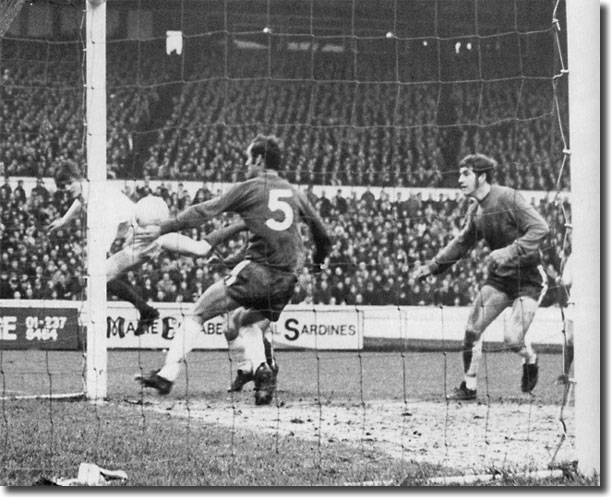 He
finished on the ground behind the net as he saluted the opening goal.
He
finished on the ground behind the net as he saluted the opening goal.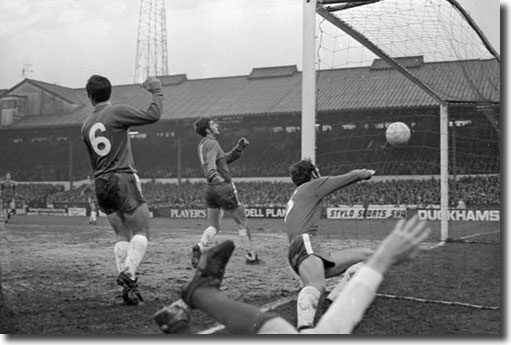 manager used the opportunity to shake things up, relying on the tactical
switch that he had used so often in the past when United were up against
it: he threw captain Bremner up front and sent his men out into all out
attack.
manager used the opportunity to shake things up, relying on the tactical
switch that he had used so often in the past when United were up against
it: he threw captain Bremner up front and sent his men out into all out
attack.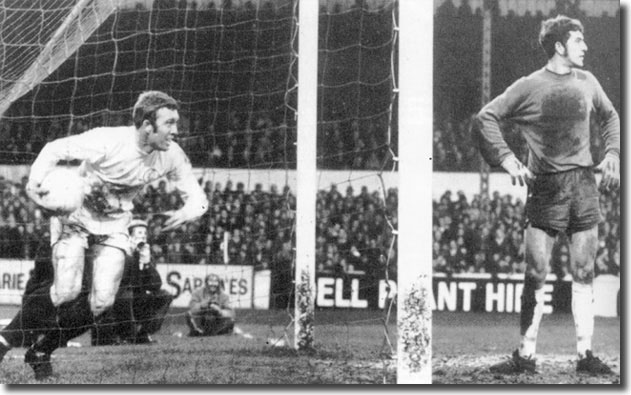 analysis they could do nothing to deny Don Revie's men on a day when everything
clicked into place.
analysis they could do nothing to deny Don Revie's men on a day when everything
clicked into place.